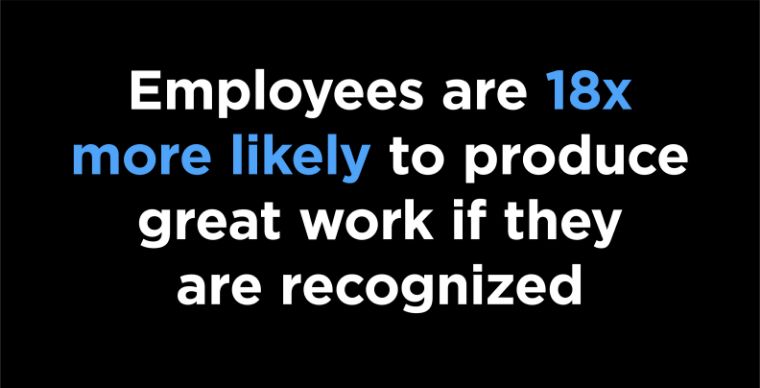Employee Recognition: The Fuel for Great Work

Updated on
March 18, 2025
18
March
2025
One way to define energy is the power or capacity for doing work. Scientists who study energy constantly seek the most efficient and sustainable sources to produce it. And wind is one of the most efficient. Once wind turbines are built and operational, the only ingredient required to produce energy is strong gusts of air—resulting in a near-endless supply of sustainable power.
In the business world, leaders measure another kind of energy—the ability of their employees to do great work. Leaders look for the best ways to inspire and sustain impactful work that makes a difference for customers and helps the organisation grow.
Over time, one practice is proven to have a greater impact on great work than any other: Recognition.
When asked, “What is the most important thing your company could do to cause you to produce great work,” the number one employee response was “Recognise me.” This underscores the power of recognition.

Keep reading to learn what great work is, and how recognition motivates employees to do more of it.
First things first. What is great work?
O.C. Tanner’s New York Times Bestseller, Great Work, defines great work as “work that makes a difference people love.” Unlike everyday work, or work that is merely good enough, great work involves extra effort, creativity, and innovation that makes a difference to the receiver of the work. From the inventions that change the world, to products that make life better, to that special touch of personal service we receive in a restaurant or a store, great work stands apart. Organisations everywhere seek to inspire it, and human beings derive fulfillment from achieving it.
As the world leader in employee rewards and recognition, O.C. Tanner has a unique view into millions of written accounts of great work each year. A careful analysis of 5 million of these award-winning work moments helped us identify five specific skills involved in the creation of great work. Employees who consistently accomplish great work demonstrate the following behaviours.
1. Ask the right question
Great work begins when people ask how they can make a difference (or if there’s something new the world would love) and then focus on who their work serves—whether it’s customers, clients, team members, or leaders.
2. Go and see
Employees who do great work observe and examine from a variety of perspectives to see new possibilities. They look at what’s being done now, how people experience it, and then imagine how it could be improved.
3. Talk to an outer circle
Great work improves when people talk to others they wouldn’t normally interact with and generate ideas they wouldn’t normally think of. Employees who consistently do great work invite others to join them, networking with people beyond those they know.
4. Improve the mix
People who do great work don’t make improvements randomly. They look before they leap. They think, plan, and fine-tune the changes they make, often adding improvements and removing elements that don’t work or don’t add value.
5. Deliver the difference
Great workers are laser-focused on positive outcomes. They persist until they get results. If their work isn’t loved the first time, they learn why and try again.
This is a brief summary of the skills. For a full explanation, check out our Global Culture Report.

Why focus on great work?
A Great Place to Work study found that a genuine 'thank you' from those in corner offices can ignite a 69% increase in the likelihood of employees bringing extra effort to the work floor. That extra effort is the very fuel that makes great work happen.
Complementing that study, our O.C. Tanner research found that employees are 18x more likely to produce great work if they are recognised. That’s the true power of appreciation.
Interestingly, our Global Culture Report questioned whether tracking metrics like engagement is the most effective way to improve business results. The data strongly suggests that a far better predictor of success is great work. Compared to worker sentiment (engagement), the research showed that work output is a superior metric—and pursuing it leads to far greater individual, team, and organisational results.
The data also revealed that a great-work approach to performance and business results was more actionable for organisations. So how do you inspire great work? We found that creating strong cultures of recognition, inclusion, and leadership enables employees to better succeed at accomplishing great work.

Great work leads to recognition. Recognition leads to great work.
Going back to our wind turbine analysis, more energy is produced every time there’s a steady wind. A similar relationship exists with recognition. Every time great work is celebrated, the odds of more great work happening increase substantially. Continuous recognition for great work inspires more great work.
O.C. Tanner’s bestseller, Appreciate: Celebrating People, Inspiring Greatness, describes the positive cycle that occurs when people are frequently recognised for doing great work:
“When someone verbalizes their appreciation of great work they shine a light not just on the work itself, but on a person’s strengths, abilities, and even opportunities. Verbalizing the appreciation teaches people about their possibility for the future. If you think back to when, and how, you found out you were good at something, the chances are high that someone pointed it out to you…that instance of appreciation sent a powerful message to you about who you are, what you can do, and who you could become.”
It’s one thing when employees believe they can do a job. But that feeling multiplied tenfold when a leader or colleague tells them they do it well and they love their work. That’s the exponential power of employee recognition.

Here’s a real-world example of how the recognition cycle happens: Norton Healthcare created a new program to enable employees to recognise one another’s everyday efforts and notable work. Now, when great work happens, monthly employee communications help spread the word, in turn reminding others to recognise more great work.
By doing this, leaders engage all of their business units to help ensure recognition occurs across the organisation. “Being able to use the system to help with different initiatives we are working on and consistently tying it all back to recognition has been very impactful,” notes Jason Coffey, director of employee experience.
Shining light on great work: real world examples
Modern leaders know that recognising people for great work helps build high-performing cultures of innovation and success. Here are a few examples:
CIBC previously had a long-standing quarterly awards program to formally recognise employees when they performed great work. However, the bank wanted to modernize how it recognised employees. While recognition was well-ingrained in their culture, the programs and processes to recognise needed updating. Leaders were looking for a purpose-aligned, automated, and easy-to-use platform that could track recognition and make it more visible across the organisation.
Partnering with O.C. Tanner, CIBC created the MomentMakers program through the Culture Cloud® platform. Better tracking of recognition and the ability to copy leaders when recognition was given helped employees see their own—and others’ great work. “You can look back at your history and see the great work you did and the recognition you received for it,” says Justin Zelnicker, a senior recognition analyst at CIBC.

Capital One, a leading financial services company, also inspired employees to perform better. The company launched its recognition program, powered by Culture Cloud, to its 51,000 associates and 145 business units across the organisation. With more great work being called out, employees shared how they are more motivated to contribute to the success of the company through personal efforts to increase job performance.

Recognition gains power when integrated
Of course, great work doesn’t just happen—even with recognition. One way to ensure that the recognition cycle continues to inspire employees to do great work is to celebrate the work as it occurs.
Researchers at the O.C. Tanner Institute found that recognition should be a constant, integrated element of an organisation’s culture. To be integrated, they emphasise that recognition must be personalised, part of the daily employee experience, and celebrate a variety of achievements.
It’s no surprise that when recognition is integrated into the natural flow of work, it’s far more likely to be given in a timely manner and have the greatest impact on inspiring others to succeed.
When leaders and peers frequently show appreciation for people’s contributions, employees feel connected to each other, to the organisation’s purpose, and to success. And, as we’ve already established, celebrating success will inspire even more successes down the road.
Keep up the great work
Employee recognition is one of the best ways to inspire and sustain creative and impactful work at any organisation. Shining a light on someone’s work efforts sends a powerful message to them individually about who they are and what they can accomplish in the future.
Great work is just one positive outcome of employee recognition. In addition to improved engagement and production, recognition improves loyalty (and longevity), a sense of belonging, and greater personal satisfaction, fulfillment, and wellbeing.
There’s no better way to inspire more great work in your organisation than with O.C. Tanner’s Culture Cloud® employee recognition platform.



